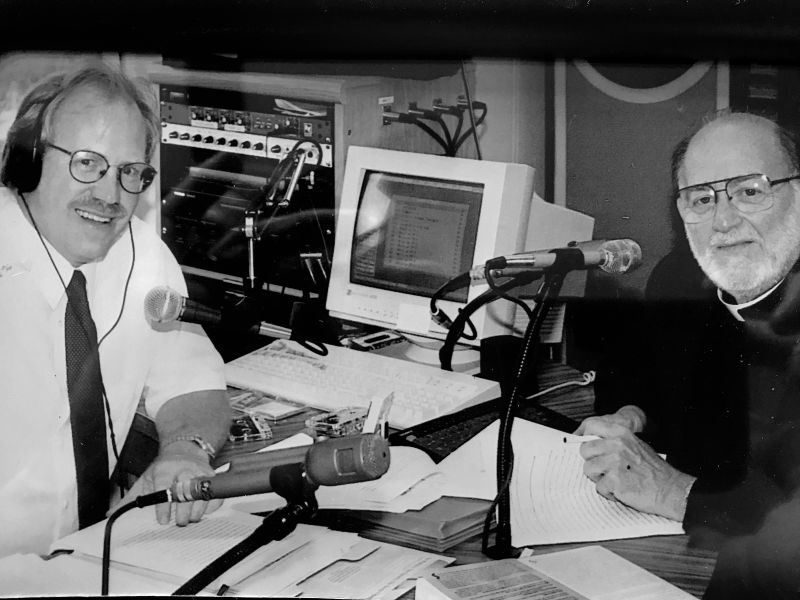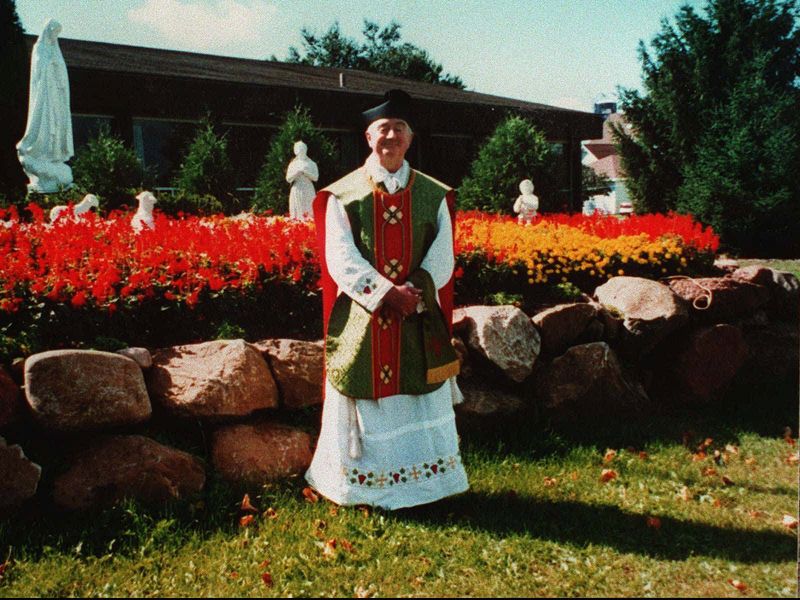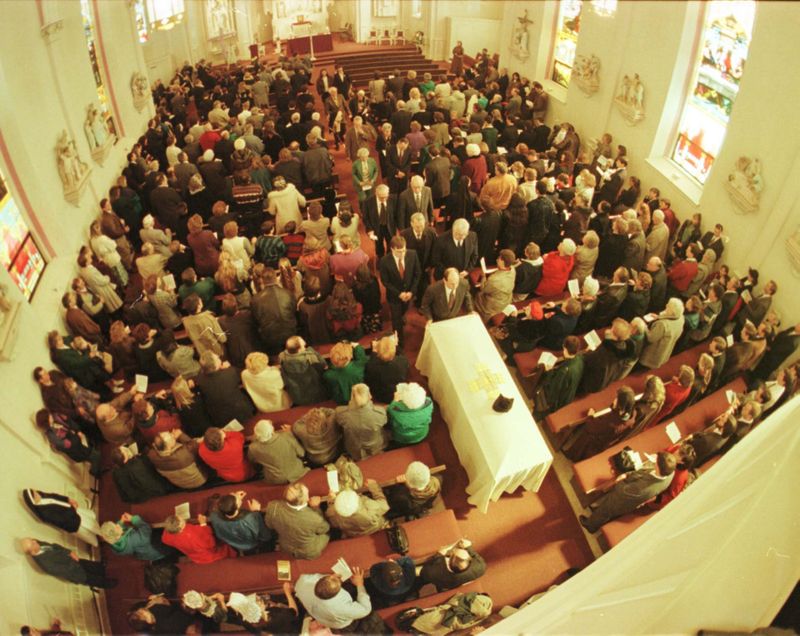Instruct the Ignorant
Journal Sentinel
Instead, Kunz spoke matter-of-factly with Kelly, an attorney and St. Michael parishioner, about the sacraments. They often discussed the temptations of the world and the repercussions of giving in to them. Kunz’s slight Swiss accent, passed on by his immigrant father, did little to soften his harsh message. “When a person commits an individual mortal sin, he is subject to the same consequences as Adam and Eve,” Kunz preached in one episode. “And we know Adam and Eve were expelled from paradise. Secondly, he inherits, or he deserves, the same consequences as Satan himself.” At 67, Kunz still had a boyish face with a ruddy complexion and bulbous nose. He was going bald but had a swish of hair on the top of his head. He was on the short side, but muscular and compact. He’d even been a Golden Gloves boxer. He kept a schedule that would likely exhaust a much younger man. Kunz said Mass every day, ran St. Michael School, and oversaw the finances of both the church and the school. He also lived at the school, in a conference room he’d converted into a studio apartment.
He mentored young teachers and counseled parishioners in crisis. At the church’s Friday fish fries, Kunz tied on an apron and cooked the cod. When parishioners’ cars broke down, he popped open the hoods and coaxed the engines back to life. And he mowed the cemetery. Not long before his death, Kunz decided the radio show was just too much. He convinced Fiore, his confidante and confessor, to take over the microphone. Fiore had slowed down in recent years due to a heart condition that left him breathless at even the smallest amount of physical exertion. While Kunz was overextended, Fiore was a priest without a parish. He had parted ways with his religious order, the Dominicans, in the 1980s. After that, in an unusual arrangement, a bishop in Puerto Rico agreed to supervise him even though he never actually ministered there. After his parents’ deaths, Fiore became the face of his family’s real estate development company, using part of his inheritance to build a mansion at the top of a hill overlooking northwestern Dane County. He called it Monte Cristo, which translates to “Mountain of Christ.”
On the night of March 3, 1998, Fiore joined Kunz and Kelly in the WEKZ studio in Monroe so they could teach him the ropes. After recording several episodes, the two priests began their 60-mile drive back to St. Michael. Kunz was oddly quiet as Fiore drove through the darkness, snowflakes becoming mere drops of moisture as they hit the windshield and the road. Fiore later told a Madison newspaper reporter the expression on his friend’s face seemed troubled. Finally, Fiore broke the silence: “Al, you’ve been a good friend for so many years.” Kunz said nothing. Fiore waited a beat, then spoke again: “Al, you know, I really do love you.” In the dim dashboard light, Fiore could see Kunz’s eyes filling with tears. Fiore told the reporter he couldn’t tell what was on Kunz’s mind; Kunz’s reply gave nothing away. “I know,” he said to Fiore. “I know.” Police believe the school building was likely empty when Fiore dropped off Kunz at St. Michael around 10 p.m. About 20 minutes later, Kunz had a quick phone conversation. Tracked down by detectives, the man on the other end of the line, also a priest, said the call was about church business. After he hung up, Kunz, who was hard of hearing, turned up some talk radio. Sometime after that, the killer entered the hallway. Perhaps Kunz welcomed the person inside. Perhaps it was someone with a key or someone who’d sneaked in earlier. Maybe Kunz had failed to lock the door. Investigators don’t know for sure. Kunz and his assailant struggled. The priest got a few good punches in, bruising his hand before falling or being knocked to his knees. The killer slid a blade across Kunz’s throat. He pitched onto the floor, where he bled to death. Brian Jackson, the teacher who called 911 to report Kunz’s death, gave police this account of what happened the next morning: The first to arrive for school, Jackson glanced through the two sets of glass doors and saw someone or something on the floor. A pool of liquid — it looked black — seeped across the width of the hallway from one wall of lockers to the other. At first, Jackson thought the figure face down in the sludge was a child. When he got closer, he recognized Kunz. Jackson dropped his bags and threw off his coat and sweater. He ran to Kunz, probing the priest’s neck for a pulse, and was reassured when he thought he felt a faint throbbing. He ran to the principal’s office, grabbed the phone and dialed 911. “I need an ambulance at St. Michael School in Dane. The father, the priest at the school, is in a pool of blood on the floor,” Jackson panted. Was the man alive? The dispatcher wanted to know. Jackson wasn’t sure. Did he have a pulse? Jackson thought so. Did he know where the priest was bleeding from? Jackson didn’t. He dropped the phone and rushed back to Kunz. Thirty seconds later Jackson was back on the line: “There’s so much f----ing blood,” he told the dispatcher. “I have no idea where it’s coming from.” Did he know CPR? Jackson didn’t. The dispatcher relayed instructions, and Jackson dropped the phone again. Kunz was stiff as Jackson rolled him over. The priest’s face was purple. Jackson tried to open Kunz’s mouth to breathe for him, but his jaw wouldn’t move. Jackson ran back to the phone, his voice becoming a high-pitched shriek. “Oh my God, someone slit his f----ing throat. I think somebody murdered him.” Jackson dropped the phone again, running back to the body. He slapped Kunz’s face, trying to rouse him. The teacher shook the priest’s arms, trying to will him back to life. “Father!” he wailed. “Father!” Before the end of the 911 call, Jackson told the dispatcher one more thing. Some detectives brushed it off as a silly comment that must have come from watching too much TV. Others weren’t so sure. What Jackson said was this: “I suppose I’m a suspect.” How we reported this story In reporting this story, Milwaukee Journal Sentinel reporter Gina Barton conducted dozens of interviews with those involved in the case. She attended the 20th anniversary Requiem Mass for Father Alfred Kunz and visited the Queen of the Holy Rosary Mediatrix of Peace shrine in Necedah, Wis. The Dane County Sheriff’s Department declined to release its case file to the Journal Sentinel, citing an exemption to the state’s public records law for open cases. Barton reviewed 50 pages of department reports that had been released to the Journal Sentinel in 1998 and remained on file in the newsroom. Those reports document the initial police response to the 911 call and several interrogations of Brian Jackson and people who knew him. Barton read court records, archival records detailing events at the shrine and portions of Malachi Martin’s book on exorcism, “Hostage to the Devil.” She also reviewed dozens of print and television news reports about the Kunz homicide and investigation. In addition, Barton listened to seven and a half hours of the “Our Catholic Family” and “Our Apostolic Church” radio programs. Recordings of the programs were provided to the news organization by Peter Kelly, who produced them. Descriptions of Kunz’s feelings, beliefs, experiences and teachings were taken from statements he made on the show in 1997 and early 1998. Father Charles Fiore also spoke on some of the recordings. Details and quotes in scenes were obtained through interviews with those present or from police reports, court records, transcripts, archived news reports, video recordings or audio recordings. Brian Jackson spoke briefly in person to Journal Sentinel reporter Ashley Luthern. He said he is innocent and believes the investigation was waylaid by the fact detectives spent so much time on him. He declined a detailed interview, saying his lawyer had advised against it. Jackson’s thoughts, feelings and interactions with Kunz, as conveyed in the story, come from police reports in which he described them to detectives. In all other instances in which people’s thoughts are described, they conveyed those thoughts to a reporter. Throughout the series, quotation marks indicate a subject’s exact words as written in a transcript, as recalled by a party to the conversation or as stated to a reporter, either now or at the time of the incident. Italics indicate statements recalled or summarized by a third party in an interview, a news story or an investigative document, such as a police report. People who provided information for this chapter include Lt. Kerry Porter, Sheriff David Mahoney and retired detective Dawn Johnson, all of the Dane County Sheriff’s Department; Peter Kelly and former reporter Chuck Nowlen. Father Charles Fiore died in 2003. The sheriff’s department declined to release the recording or the full transcript of the 911 call, but portions of it were detailed in a police report obtained by the Journal Sentinel.
|
.
Any original material on these pages is copyright © BishopAccountability.org 2004. Reproduce freely with attribution.


